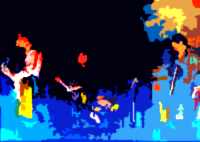
Music Distribution
We are currently experiencing some short-term hiccups with our physical CD distribution: in the meantime please click on the album links on our Albums page and hit the Amazon buying links to check if your title is available .
Download sales continue to be available via the usual services and you can also still stream our music as usual.

Music Distribution
We are currently experiencing some short-term hiccups with our physical CD distribution: in the meantime please click on the album links on our Albums page and hit the Amazon buying links to check if your title is available .
Download sales continue to be available via the usual services and you can also still stream our music as usual.


Wire Central
‘I still happen to rate Wire as by far the most innovative, nonconformist and generally compelling UK unit to have surfaced in recent months.’ Angus MacKinnon, New Musical Express, about the 22nd February 1978 gig at London’s Lyceum, supporting XTC.
‘Their music makes few concessions to current fashions, occupying a left-field space entirely its own.
It’s disturbing, and never allows the listener to fully relax: but it’s not entirely without humor, and, more importantly, their preoccupation with terse, violent salvos (which allows them an unusual freedom) is never self-consciously experimental. It is a perfect setting for their inventive and original lyrics. A band of substantial promise.’ Allan Jones, Melody Maker.

A relaxing nite out with Wire
 ‘Even through struggles with chords and a collapsing keyboard, I remember clearly the flying gob and spraying beer. Perhaps you forget those things when they’re coming at you if you’re grappling with the music.’
‘Even through struggles with chords and a collapsing keyboard, I remember clearly the flying gob and spraying beer. Perhaps you forget those things when they’re coming at you if you’re grappling with the music.’
Read Mike Thorne’s account of playing keys for Wire in Middlesborough, England, October 1978.
Wire 1977-1979 by Kevin Eden
 Much has been written about the birth of British Punk and the explosion of groups that occurred.
Much has been written about the birth of British Punk and the explosion of groups that occurred.
Read the rest of this account of the EMI years, originally written for a CD set which never came out.

Wire…Everybody Loves A History
by Kevin S. Eden
SAF Publishing Ltd, ISBN 0 946719 071 Front cover photo: Andrew Catlin
Click to bounce to Amazon’s site to buy it, or for more details of Wire…Everybody Loves A History. This is the most thorough book on Wire. There is also a dual-language publication from Italy: Wire: Exploded Views, Alessandra Libutti, (Collana Sconcerto, Italy, May 1994), ISBN 88-7226-172-4.. Includes Live – May 1990 CD, discography, and some lyrics. “Sixth”, “What”, and “Underwater” are “Sixth Sense”, “What Do You See?”, and “Underwater Experiences”, respectively.
Wire: New York Times pop review 2000
by Jon Pareles
Hindsight has struck Wire, the English band that formed in 1976, broke up in 1980, regrouped in 1985 and dissolved in 1990. Bypassing two decades of dabbling with their synthesizers, Wire is touring in its original configuration of two guitars, bass and drums. The band has also returned to some its best, and earliest, songs. It opened its set at Irving Plaza on Monday night with Pink Flag, the title song from its debut album in 1977. From its 1980’s repertory, it chose not its catchiest tunes but songs like “Boiling Boy” and “Advantage in Height” that easily revert to guitar work workouts.
 Unlike the reunited Sex Pistols, Wire didn’t set out to recreate punk. It wasn’t out to jolt its audience the way it was in the live recordings on “Documentary and Eyewitness” (Mute). Now, it’s approach is less brash and more considered, letting songs stretch until the music envelopes and mesmerizes listeners. Wire was already post-punk, or at least art-punk, before punk hardened into a genre. Even in its early songs, most lyrics were telegraphic and surreal, not blunt.
Unlike the reunited Sex Pistols, Wire didn’t set out to recreate punk. It wasn’t out to jolt its audience the way it was in the live recordings on “Documentary and Eyewitness” (Mute). Now, it’s approach is less brash and more considered, letting songs stretch until the music envelopes and mesmerizes listeners. Wire was already post-punk, or at least art-punk, before punk hardened into a genre. Even in its early songs, most lyrics were telegraphic and surreal, not blunt.
As the band members grew proficient on their instruments, it became clear that Wire was fascinated most of all with evolving patterns: a minimalistic tendency that goes back to punk’s Velvet Underground roots. Punk and minimalism, two influential avant-garde in the 1970’s, were disparate siblings — one disruptive, one meditative –but both used strategies of simplicity and repetition.
At Irving Plaza, Wire set out its songs with unflappable rigor, as if the power of the music was purely impersonal. Robert Gotobed’s drumming was deliberately mechanical, stating on beat and repeating it precisely. Colin Newman, on guitar, and Graham Lewis, on bass, usually sang without raising their voices, though allowed themselves and occasional groan or smirk. Along with Bruce Gilbert on guitar, they bore down on meticulously plotted instrumental passages. The steadfast medium tempos and clearly legible structures of the songs turned into measured maelstroms. Fast-strummed guitar chords built crescendos as overtones swirled through the room; drones were activated by selectively distorted guitar tones and layers of consonance and noise. Wire’s finale, Drill, headed for the textural wilderness of Sonic Youth.
Wire did hold on to one punk souvenir: the short set. After 55 minutes of fiercely concentrated music, the band was gone.

